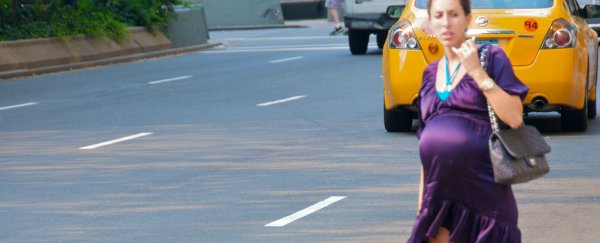A new study by Harvard University researchers has added further weight to a suspected link between air pollution and autism spectrum disorders.
The researchers found that women who had been exposed to high levels of air pollution in their third trimester of pregnancy were up to twice as likely to give birth to a child with autism than mothers who lived in regions where the air was cleaner.
The study also found that the higher the exposure to fine particulates - the type of air pollution emitted by fires, industry and car exhausts - the higher a mother's risk of giving birth to a child with autism.
The research has been published in Environmental Health Perspectives, and the scientists hope it will shed some light on why the rate of autism continues to increase around the developed world. Currently the disorder affects 1 percent of the global population, but in the US that rate is as high as one in 68 children.
Back in 2010, a smaller study also found a similar connection between autism and a mother's exposure to pollutants, but this is the first US-wide research.
In order to assess the link, the scientists from Harvard University looked at children born to the 116,430 women who had taken part in the unrelated Nurses' Health Study II, which started in 1989.
The longevity of this study meant that the researchers were able to look at where the women lived while pregnancy and the levels of fine particulate pollution in those regions.
Using the data, the researchers were able to compare the prenatal histories of 245 children with autism spectrum disorder to 1,522 children who had developed normally. All were born between 1990 and 2002.
They found that there was no link between autism and the amount of air pollution a woman was exposed to in early pregnancy, or after the child was born. But high exposure during the third trimester doubled the risk of autism spectrum disorder.
"We found an association that was specific to pregnancy and especially to the third trimester, identifying a window, which might shed a light on processes that are happening that can lead to autism," Marc Weisskopf, the lead author of the research, told NBC News.
He also told Sharon Begley from Reuters that evidence that a pregnant woman's pollution exposure affects her child's risk of autism "is becoming quite strong".
Scientists still aren't sure how pollutants could be involved in autism risk, but it's thought that these fine particles could potentially penetrate cells and lead to brain disruptions.
However, it's still very early days and we can in no way say that pollution causes autism. All we know is that there's more there to investigate, and this new research gives us a solid starting point.
In fact, in general, researchers still don't know a whole lot about how autism is caused, but we're getting closer to figuring it out.
Right now, scientists are sequencing the DNA of more than 10,000 families affected by the disorder to try to find some answers. And earlier this year researchers from John Hopkins University in the US found that a compound in broccoli sprouts can help to improve autism symptoms.
The only thing we know for certain, after a study of more than 1.25 million children, is that there is NO link between autism and vaccines.
Hopefully in 2015 we'll take some more big steps towards figuring out this disruptive disorder, and finding potential new treatments for sufferers.
Source: Reuters via Scientific American, NBC News
